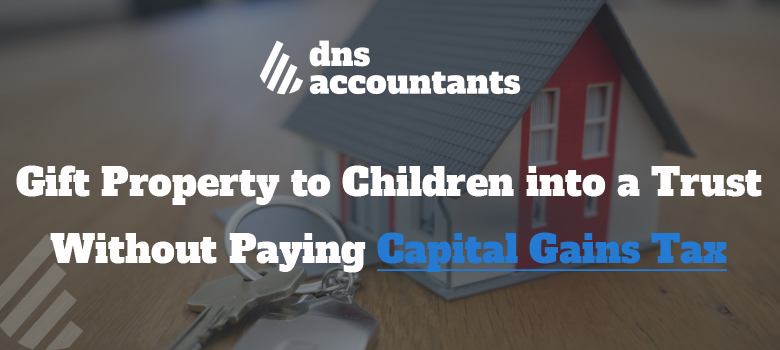
Before income and estate tax laws were brought into effect, most children would simply move into their family home after their parent’s demise. It is not as simple anymore.
There are several legal ways in which you give your house to your children, and some of these ways allow you to do it tax-free. However, if you want to avoid paying extra taxes, you’ll have to plan. To arrange a free consultation give us a call on 03300 887 912
Before learning more about creating a trust or reducing IHT taxes, let’s quickly know a bit about the taxes you might have to pay:
Taxes you are Required to Pay
Stamp Duty Land Tax or SDLT – you’ll have to pay this tax depending on the amount you’ve received from your child.
Capital Gains Tax or CGT** –** you’ll have to pay this tax calculated on the market value after deducting purchase value.
Inheritance Tax or IHT – you’ll have to pay this tax that’s brought back into the estate if the donor dies within seven years of making the gift.
When dealing with gifted property, it’s crucial to understand the specific considerations for stamp duty, capital gains tax, and protection in divorce proceedings, as these can significantly impact the financial and legal aspects of the transaction.
Basic Overview of Gifting your Property to Children Tax-free
The buy-to-let properties, including rental property, are initially transferred to a trust and then back to your adult children. It is primarily done:
- To reduce payable income tax for the parent – mainly if they belong to the higher taxpayer group, especially when transferring a rental property to a trust can also mitigate income tax implications.
- To provide an income to the child (or children)
- To reduce the overall value of the asset for IHT purposes for the parent
If you don’t want to pay Capital Gains Tax and like to avoid Inheritance Tax, you should transfer your estate properties to your children. Usually, you would be liable to pay CGT when you transfer a BLT property to your children. Capital gains are computed on the market value of the property, minus purchase price and refurbishment costs. HMRC assumes that the property’s market value was obtained by the parent – even though the parent gave away the property for free.
Are there any Benefits of Gifting BTL Properties to Children or other Family Members?
Parents would like to help their children get ahead on the property ladder, but the mortgage interest relief cap of Section 24 has hugely impacted the taxes of parents.
There are several benefits to gifting BTL properties to children. Some of the advantages are:
- Parents can enjoy reduced income tax because the transferred BTL property won’t be considered as an income-producing asset.
- It will reduce the Inheritance Tax and also get your children to get ahead on the property ladder.
- You don’t incur the Capital Gains Tax on transferring the BTL property.
Please note that you don’t have to transfer or gift the property only to your children. You can gift the property to any loved one or family members.
Another point you should note is that the transfer of property using trusts will only work in your favor if you transfer the assets to an adult child. If parents transfer the assets to a minor, they will still be considered a part of their estate. And, any income generated from the asset will be considered as an income for the parent.
Is it Possible to Place Your House into Trust for Your Children?
It is possible to reduce the overall Capital Gains Tax and the Inheritance Tax by putting the property into a trust. However, if you are gifting your house – the house you live in – to your children, you won’t incur Capital Gains Tax.
Capital Gains Tax is only applicable when you gain some taxable benefits from the property. Additionally, you also don’t have to worry about paying Inheritance Tax if you gift your property to your children – provided you live for at least seven years after gifting.
How to Transfer Property to Children without paying Capital Gains Tax and Inheritance Tax
It is a step-by-step guide to help you transfer property to your children without incurring CGT and IHT.
Start by identifying your property that has a value of £325,000 or lower. This amount falls below the IHT limit. Any property that’s valued above this baseline will automatically be subject to Inheritance tax at 20%.
- Then, transfer the property into a trust – which is debt and mortgage-free.
- Calculate the Inheritance Tax applicable.
- Transfer the property or the assets from the trust to your adult children. Make sure you transfer the assets three months after the trust has been created.
- Now, calculate the IHT exit charges.
- Make sure you submit the completed IHT 100 Form within 12 months of the property transfer.
Create a Trust TCGA Section 260 to Avoid CGT
You have to convert the buy-to-let property into a legal structure so that you can avoid paying massive Capital Gains Tax and incurring IHT. The legal system that deals with this is Section 260 of the TCGA.
The tax calculations are complex. Always make sure you get legal assistance from a qualified solicitor who knows the workings of property transactions. A tax specialist with experience in handling property accounts will be most helpful to you.
IHT and Exit charges by Transferring Property into Trust and then to Adult Child
You have to wait a minimum of 3 months before transferring the property from the trust to your child or other family members. To create trust, make sure you seek help from experienced solicitors.
It would help if you wait for at least three months after transferring the property into the trust to hand over the asset back to your child. Once you have moved the assets to your child, you also have to consider exit charges.
PET and IHT Tax Bill
The PET – Potentially Exempt Transfer – means that the person transferring the property to another family member would still have to pay IHT if they die within seven years of the original transfer. The PET is completely exempted if the donor survives 7 years after the original transfer. On the donor’s death within 7 years of the initial property transfer, an Inheritance Tax will be levied on the gift recipient. Understanding when and how to pay inheritance tax is crucial for recipients of gifted properties, as it involves navigating potential tax implications, including inheritance tax, stamp duty, and capital gains tax.
Wrapping Up
It is essential to seek help from a qualified solicitor or taxation specialist if you wish to gift your property to your children or other loved ones without having to pay IHT or Capital Gains Tax. The laws can get complicated, and it is vital to have all the information needed before making a decision.
Frequently Asked Questions – FAQs
What is the process of gifting property to children into a trust without paying capital gains tax?
The process involves transferring the property into a trust for the benefit of the children, thereby potentially avoiding capital gains tax.
Are there any tax implications when gifting property to children into a trust?
Yes, there may be tax implications, and it’s important to consult with a tax professional or attorney to understand the potential tax consequences.
What are the benefits of gifting property into a trust for children?
Gifting property into a trust for children can help protect the assets and potentially minimize tax liabilities.
Can gifting property into a trust for children help with estate planning?
Yes, it can be a valuable estate planning tool to ensure the smooth transfer of assets to the next generation.
Are there any legal considerations when gifting property into a trust for children?
Yes, it’s important to follow legal guidelines and consider the implications of the transfer on the trust and the children.
How can I ensure that the trust is set up correctly when gifting property to children?
It’s crucial to work with a qualified attorney or estate planning professional to ensure the trust is structured appropriately.
What are the potential risks or downsides of gifting property into a trust for children?
There may be potential tax or legal risks, so it’s important to thoroughly understand the implications before proceeding.
Can gifting property into a trust for children affect eligibility for government benefits?
Yes, it’s important to consider how the transfer of assets into a trust may impact eligibility for government benefits.
Are there specific rules or regulations that govern gifting property into a trust for children?
Yes, there are specific rules and regulations that need to be followed, and it’s important to seek professional advice to ensure compliance.
How can I determine if gifting property into a trust for children is the right decision for my situation?
It’s advisable to consult with a qualified attorney or estate planning professional who can assess your individual circumstances and provide tailored advice.
